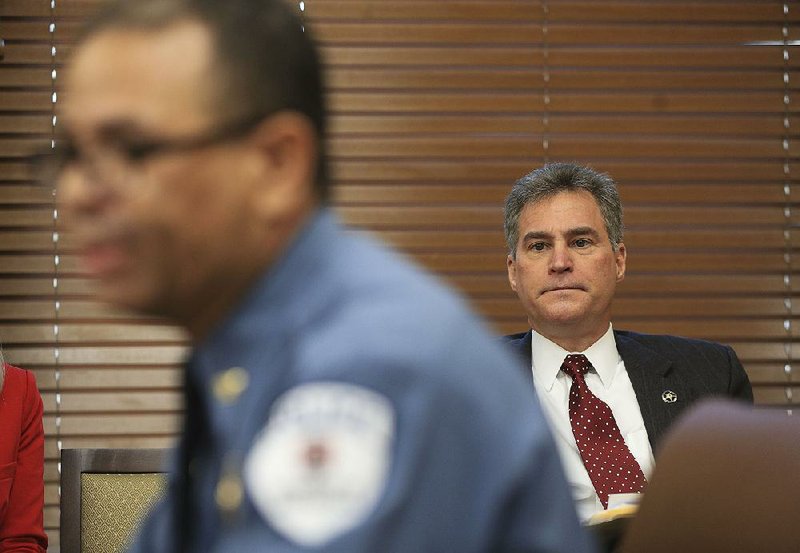Testimony from the heads of Arkansas' university and community college systems failed to sway a House committee Tuesday from voting for legislation that would allow faculty members to carry concealed handguns.
The House Judiciary Committee voted 12 to 5 to support House Bill 1249 by Rep. Charlie Collins, R-Fayetteville, which would remove the current state-law option for public colleges and universities to enact policies prohibiting concealed carry on campuses. Only one Republican, Rep. Carol Dalby, R-Texarkana, voted against HB1249; no Democrats voted for it.
If passed, the legislation would allow faculty members with Arkansas concealed-carry licenses to carry on most campus grounds. Students would still be barred from carrying guns.
The option to allow concealed carry was given to campuses in 2013 as part of a compromise Collins said he reached when attempting to end a larger ban on concealed carry.
Since then, every institution has opted against allowing concealed carry, and a subsequent attempt to change the policy by the Legislature failed.
Now, Collins says he wants to try again out of concern that colleges attract mass shooters because of the lack of gun carriers.
Citing studies showing mass shootings are closely calculated, Collins said the inability to plan around possible interdiction by a concealed-carry holder would dissuade such attacks.
"Some of these killers would say, 'I'm not going to go to the college to kill people today,'" Collins said.
A jampacked audience at the state Capitol committee room at times provided vocal reaction -- through laughs and murmurs -- as Democrats and public speakers spent nearly two hours attempting to poke holes in Collins' position.
The crowd that gathered to watch the debate was too large for the room and spilled into the hallway.
Among the audience was Rep. Greg Leding, D-Fayetteville, whose district includes the University of Arkansas and who has vocally opposed the measure, encouraging opponents to attend Capitol hearings and call representatives.
"Campuses oppose it, law enforcement oppose it, students, parents, faculty oppose it, so I don't know what we're doing," Leding said after the committee endorsement.
The committee chairman, Rep. Matthew Shepherd, R-El Dorado, had to admonish the audience at one point after a smattering of applause during the testimony of University of Arkansas Police Director Steve Gahagans, who opposed the bill.
"When you bring more guns to the table you have to understand you bring more risk," Gahagans said.
After Gahagans' testimony, more than a half-dozen university officials, faculty members and residents spoke against the bill. Speaking for the bill were a technical college president from Springdale and a landlord from Faulkner County.
No one from the National Rifle Association spoke, but committee members were sent a letter from the group early Tuesday morning urging them to vote for HB1249.
Echoing language of the letter, several Republicans said leaving decisions on concealed carry to individual professors and faculty members -- instead of the college trustees -- further localizes control.
Democrats asserted that Collins' bill, while well-intended, was bound to produce unintended consequences, from a flight of top-quality students from state institutions, to confusion during active-shooter situations involving "a good guy with a gun."
Collins said he would reconsider the policy if it is proved to contribute to a decrease in the enrollment of high achievers.
Gahagans, who said he had years of active-shooter training and SWAT team experience, said scenarios involving concealed-carry holders can still befuddle his response. Campus police do not need or want that added risk, he said.
"I still sometimes today will shoot the person that I should not have shot," Gahagans said, referring to training simulations.
Republicans repeatedly questioned Gahagans about whether he was there to speak for himself or the university. Gahagans said he was on duty speaking for himself but was supported by university officials.
The bill goes to the full House, where a similar version received strong support in 2015. The Senate, Collins suggested, was another matter.
"They bottled it up in the Senate last time," Collins said. "I'm optimistic that what we're doing is the right thing and the senators will see that as well."
Republican Gov. Asa Hutchinson has not taken a stance on the bill.
A Section on 02/01/2017
